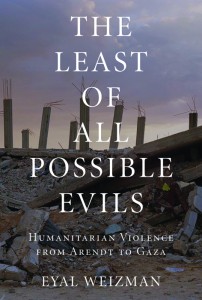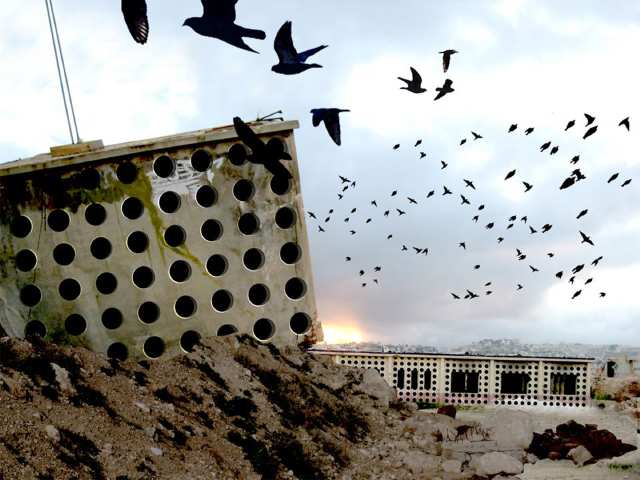Review: ‘The Least of All Possible Evils: Humanitarian Violence from Arendt to Gaza’ Books
Books, New in Ceasefire - Posted on Monday, June 4, 2012 15:17 - 0 Comments
By Alex Baker
“Return to Nature”, The Transformation of the Military Base of Oush Grab (The CrowÕs Nest). (Photomontage by Sara Pellegrini, courtesy of Decolonizing Architecture/Art Residency)
In his seminal study Modernity and The Holocaust, the sociologist Zygmunt Bauman observed that in every stage of their extermination, European Jews were compelled to rationalise their co-operation through a series of choices, thereby engaging in a set of cost-benefit calculations in which they could not win. Leadership in the ghetto was encouraged, both tacitly and explicitly, to ‘save what it could’ of Jewish life and culture by bargaining off people and resources here and there in the hope that some small remnant could be preserved.
For Bauman, The Holocaust, far from being an event singular in nature, was the convergence of pre-existing elements of a society in which you can have any colour you like, as long as it’s black. As such it had a vital lesson to teach about the operation of power and choice in society.
Looking back to 2010 it is strange to find that Bauman’s broader body of work was being cited as a major influence on a supposedly new trajectory in Labour Party policy. Today the ‘save what you can’ mentality seems to have infiltrated every aspect of policy-making in the response of the European centre-left to austerity: Partial privatisation is accepted provided public services remain ‘free at the point of use’, tuition fee increases are tolerated on the condition that loans are readily available, vital handouts quashed, provided the government preserves some tokenistic element of the legacy of Bevan and Benn.
In a new critique of humanitarian reason, Eyal Weizman terms this process the calculation of the ‘Least of All Possible Evils’, in which the mitigation of less desirable scenarios becomes the predominant paradigm of governance and activism.
The remnants of European social democracy are quite distant from the photogenically desolate plains of Korem in Ethiopia, which Michael Buerk prowled on the television screens of the 80s. This staging ground for the guilty conscience of western liberals is the starting point for Weizman’s exploration.
What the filmmaker Adam Curtis crudely characterised as the origins of ‘oh dearism‘, is understood by Weizman to be the product of a complex interaction of complicity, culture, resources, and materials in which aid became weaponised in processes of violent political and social cleansing.
During the famine Buerk reported on, Weizman claims, aid agencies like Medecins Sans Frontiers were often compelled to make decisions that one finds abhorrent; between denying vital food supplies, or distributing them in the knowledge that they might support systematic murder.
The solution the agencies and NGOs reached, Weizman argues, was to adopt a practice of harm minimisation, an inverse Benthamite project in which the least evil for the smallest number was the ethical axiom.
If aid became a form of warfare in Ethiopia, then it is unsurprising that in Kosovo, Gaza, Afghanistan, and Iraq, warfare has been re-conceived as aid. The opening of humanitarian warfare in the western military imagination has, unsurprisingly, been accompanied by the emergence of new technologies and expertise for sale to the highest bidder.
It is not their novelty, but their familiarity, which is shocking. Take Weizman’s investigation of Marc Garlasco, the man who ‘reverse-engineers’ ruins to work out how they were destroyed; a not dissimilar practice currently holds sway in large chunk of contemporary economic analysis- the impending Greek exit from the Eurozone is more than likely already being written backwards by a plethora of experts.
If there is a criticism to be made, it is that while Weizman focuses on humanitarian intervention, his main critiques are aimed at bigger phenomena. As such it’s best to see this short text as an investigation of a smaller element of a greater logic of late capitalism.
Which brings us back to the curious twilight social democracy now inhabits. The advocates of social democratic politics are frequently incapable of offering genuine innovation beyond the restoration of the post war consensus. By contrast, the radicals of the revolutionary and ultra-left in Europe, the US, and most recently, Quebec, take a special interest in experimenting with new forms of distribution, economy, housing and education- albeit experiments which often go awry.
As Weizman points out when looking at Palestinian refugee camps, old social-democratic demands, like state-provided social housing and access to healthcare, can actually provide space for abandoned, excluded and oppressed people to organise and posit their own potentialities more effectively. Social democracy has little efficacy without promising something beyond itself, a ‘Jerusalem’ of one kind or another.
 A friend I consulted, who researches geographies of humanitarian intervention, asked a question that had not occurred to me; who is this book aimed at? She had cut to a crucial point; Weizman’s chief audience seems to be aid workers, NGO employees, and the well-educated wing of the international pro-Palestinian movement.Yet it’s hard to say that this book doesn’t have relevance for a broader movement: as a study of how people, organisations, and governments rationalise their own failure, its subject is sadly all too familiar, and all too important.
A friend I consulted, who researches geographies of humanitarian intervention, asked a question that had not occurred to me; who is this book aimed at? She had cut to a crucial point; Weizman’s chief audience seems to be aid workers, NGO employees, and the well-educated wing of the international pro-Palestinian movement.Yet it’s hard to say that this book doesn’t have relevance for a broader movement: as a study of how people, organisations, and governments rationalise their own failure, its subject is sadly all too familiar, and all too important.
The Least of All Possible Evils: Humanitarian Violence from Arendt to Gaza
by Eyal Weizman
Hardback, 208 pages
ISBN: 9781844676477
Verso (June 2012)



Leave a Reply